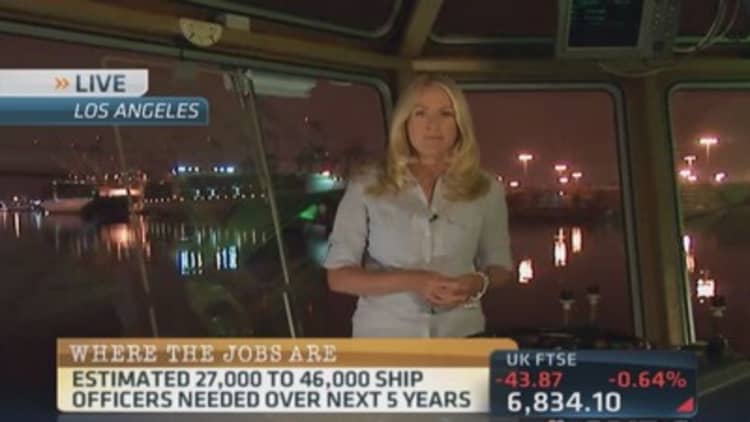
On a typical sunny Southern California day, a bright red tugboat cuts through the channel in the Port of Los Angeles/Long Beach. On the banks, containers filled with cargo are stacked high. Massive cranes dip in to pull them out one at a time and load them onto waiting vessels.
After a steep drop in activity that followed the Great Recession, the maritime industry is growing again. In 2012, global seaborne trade reached 9 billion metric tons for the first time ever, according to the United Nations Conference on Trade and Development. The growth in trade is translating into growth in jobs.
"Our plan is to hire 500 to 600 maritime workers over the next five years," said Thomas Crowley, CEO of Crowley Maritime.
The family-owned company based in Jacksonville, Florida, will find it has some competition when it looks to build its 5,000 person workforce. A 2010 report from the International Maritime Organization forecast the industry could be short 27,000 to 46,000 officers to man the world's tankers, cargo and container ships and tugboats over the next few years.
One of the key reasons for the labor shortage—the energy boom.
"When the oil industry is doing well, you end up with shortages in the maritime industry," said Bart Rogers, assistant vice president at the Paul Hall Center for Maritime Training, a school run by the Seafarers International Union.
Read MoreThis firm helps others by growing its own workforce
Along with the added demand for ships to move higher volumes of crude oil and natural gas over water, the maritime industry faces the challenge of managing an aging workforce. Increasingly, the world's vessels are commanded by officers nearing retirement age, and replacing them has become more difficult. New regulations mandated by the 2010 Manila Convention mean all hands on deck, or below, need added training and more days at sea. This means it takes longer to move up a ship's ladder from a deckhand to the skilled positions of third, second and first mate, chief engineer and captain.
"You can't just go and work on a ship or a boat anymore," Rogers said. "You have to be qualified and you have to be trained."
To make sure it is getting the workers it needs, Crowley works closely with the nation's six maritime academies, which produce officers, and the maritime unions, which recruit and then train prospective hires who start at a lower level but can work their way up.
"They are our partners," Crowley said of the unions. "They provide training, work on regulations in a number of different parts of the industry. It's an important part of how we operate."
Read MoreTraining workers for biotech labs is Mass. program's goal
Among the students at the Paul Hall Center in Piney Point, Maryland, is 30-year-old Martin McDonald. A divorced father of two and Iraq war veteran, he settled on a maritime career because he liked the lifestyle it afforded his friends who were in it.
"They have lucrative time off. They have nice houses," he said. "They live without want, essentially, when they are off ship. They travel to all sorts of places in both their careers and leisure time."
Steve Peckham, a 20-year veteran of the maritime industry and captain of Crowley's L.A.-based tugboat Scout, puts it another way.
"I work two weeks on, two weeks off," said Peckham, who lives in Rhode Island and flies to Los Angeles to work. "It's kind of like I go on vacation every month."
Getting to sit in the captain's chair takes time though. McDonald is just getting qualified to work on a vessel, meaning he is being trained in first aid, rescue and survival, firefighting and the basics of operating a ship. It's a three-month program. The former Marine will then need to log 1,080 days on a vessel before he can apply for licensing programs that would move him into the officers ranks.
"I want to have my own ship by 50," he said. "That is my goal."
If he reaches that goal, McDonald will be pulling down a six-figure salary. In general, working in the maritime industry pays well. An entry level, able bodied seaman, a classification McDonald hopes to obtain in the next 18 months, can earn $40,000 to $50,000 a year. A fully trained engineer or mate, a mid-tiered position, can earn $70,000 to $90,000.
"These are very high-paying jobs," said Crowley, who added even though the looming labor shortage has not yet hit the company's bottom line, the firm might have to pay higher wages and signing bonuses whenever there is a shortage.
Read MoreJobs available as nuclear workforce ages out
Rogers notes the shortage is not acute right now, but it is something the union, and the industry, are keeping a very close eye on.
"A lot of the shortage exists in the inland field," said Rogers, referring to vessels that sail on lakes and rivers. "We maintain our pool at two people for every job all the time. What you would like to have is 2½ people for every job."
—By CNBC's Mary Thompson


